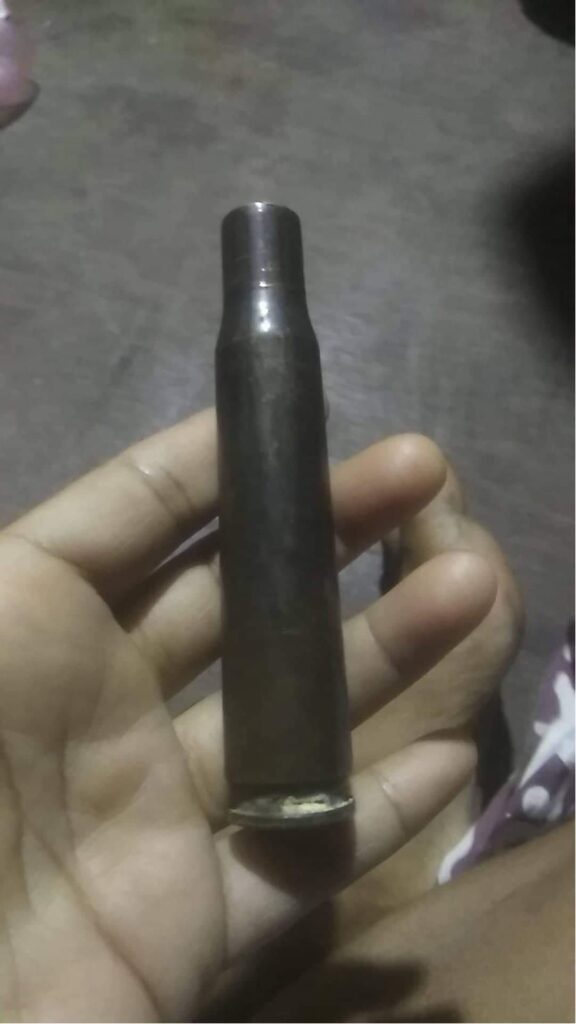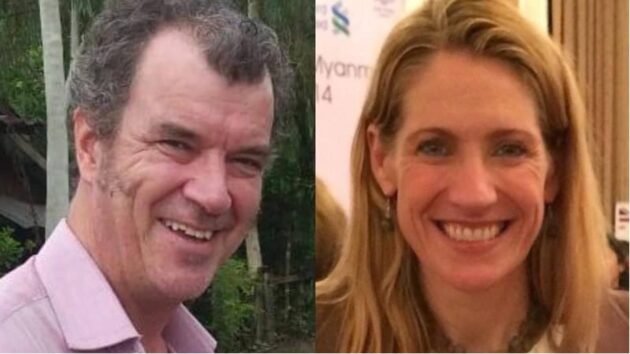22nd March 2021
We start today with a T-shirt that has been designed to be worn, initially in private, but in public once the protestors win. Optimistic I know, but it makes its point.

Below are some of the weapons employed against the civilians involved in the protest movement.

Below is the ammunition used by the heavy machine guns.


Don’t forget that these are being used against civilians involved in peaceful protesting, and warning shots aren’t fired.

Again, these are used against civilians engaged in peaceful protests. So that we don’t forget what they are used for, below is action from Mandalay.

In further developments today, the BBC reporter was released and is currently describing his treatment at the hands of the Military.
A Polish journalist detained in Taunggyi last week was released after a court-ordered a fine of 200,000 kyats (141.86 United States Dollars) today, March 22.
Australians put under house arrest.

Matthew O ‘Kane, Australian, and Crista Avery, Canadian/Australian business consultants with Avery O’Kane and Associates, Yangon have been detained by the military council at Yangon airport while trying to leave Myanmar on March 19th and have been placed under house arrest.
The reasons for the detention are unclear, but they have been involved in advising on infrastructure projects and Matthew was, until December 2017, the Financial Controller of City Mart Holdings, the biggest retailer in the country. City Mart have previously demonstrated dissatisfaction with the coup.
From October 2014 to July 2015, he was Commercial Director at the Global Integrated Service (GIS) Group of Companies, which is a
Yangon-based constellation of dynamic and complementary business entities capable of responding quickly to emerging business opportunities and their inherent development challenges. GIS specializes in the formation and management of joint ventures and special purpose commercial vehicles for corporate, private and public sector clients. Since its founding in 2005, GIS has expanded to include numerous subsidiaries and industry-specific special purpose vehicles with foreign and domestic clients engaged in the oil and gas, energy, aviation, logistics, mining, agriculture, aquaculture, human resources and tourism sectors.
Source GIS website.
Perhaps he knew too much about infrastructure development and the involvement of members of the Military. This is a worry for the diminishing number of expats in Myanmar. There is still no news of Sean Turnell the Australian academic who was detained early in the coup. The Australian Government recommended that all Australian citizens leave Myanmar unless it was essential for them to stay.
In an interesting development, Myanmar’s export of rare earths to China has been hit and this will have implications for New Zealand as like other western nations it uses rare earths in aerospace, advanced military equipment, mobile phones and electric vehicles, along with other tech products.
A critical shortage will cause prices to rise and have medium term supply issues. Many years ago, Deng Xiaoping once said “the Middle East has oil, China has rare earths.” This has strategic implications for the west as who controls rare earths controls the price and supply of base materials used in technology.
Fears are growing of a global shortage of rare earth minerals used in the manufacture of high-tech devices unrest in Myanmar coup disrupts exports to China.
Chinese companies started complaining about delays in shipments of the minerals since mid-March, reportedly due to the deteriorating political and economic situation, which Chinese media reports say have had an impact on logistics.
Hiccups in Myanmar’s supply of rare earths are the latest indicator that the February 1 military coup, launched by Senior General Min Aung Hlaing, and subsequent national chaos is starting to seriously disrupt Myanmar’s economy and businesses.
The impact on rare earth shipments is the latest sign the coup is adversely impacting China, which earlier expressed concern about the security of its twin oil and gas pipelines that run through Myanmar into southern China and other commercial interests amid a public backlash against Beijing for its perceived support of the country’s ruling generals.
Myanmar accounts for more than 60% of China’s total ion-absorption rare earth consumption for medium and heavy rare earths. In recent years, China has shifted from a 40% to 60% reliance on Myanmar for its rare earth imports, reportedly due to the environmental damage caused by their extraction domestically.
The slowed shipments have caused rare-earth oxide prices in the Chinese market to skyrocket, a spike in prices that could soon be transmitted to global markets. According to some estimates, China controls as much as 80% of the world’s rare earth mineral supplies.
Myanmar’s exports of rare earths to China increased by 23% from 2019 to around 35,500 tonnes in 2020, according to Chinese Customs data. China is acutely conscious of the strategic importance of the materials, which some analysts suggest China could withhold in the case of a conflict with the United States.
Myanmar’s rare earth mines are in the northern regions and largely under the control of local armed militias. Analysts say disputes often erupt over mine profits between the Myanmar military and the local armed groups. Kachin state, which borders on China’s Yunnan province, is home to most of Myanmar’s rare earth production and trade with China.
Source Asia Times 22nd March 2021.
If the west had supported Daw Aung San Suu Kyi more strongly, developed closer ties with Myanmar, and competed with China, they could have had direct access to the raw product. They really needed to present a united front and that is even more necessary today. It will take a united approach in conjunction with ASEAN to keep pressure on the Coup leaders.
Of course, New Zealand is conspicuous by its low profile in all this. It really does make me wonder if there is anyone in either the government or the civil service who has the ability or the desire to take a strategic view of all these developments or are they just too dependent on China? New Zealand has to make and keep alliances, and yes that does come with a price.
Please share this article so that others can discover The BFD

